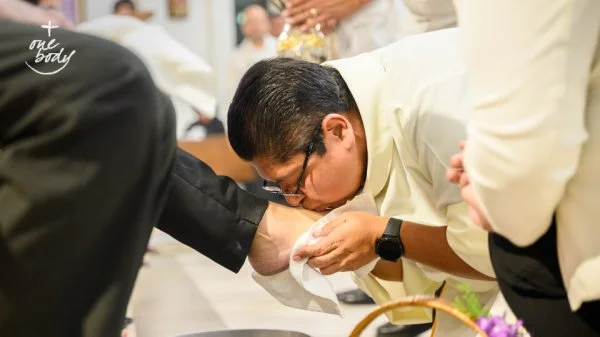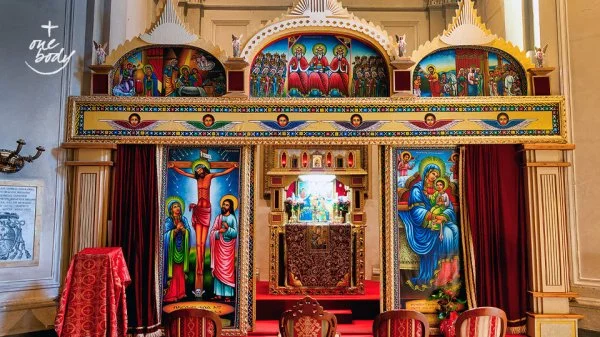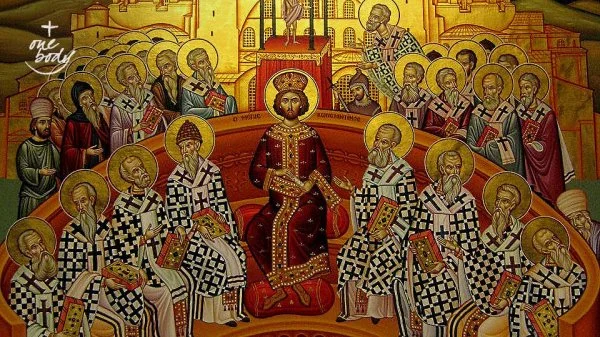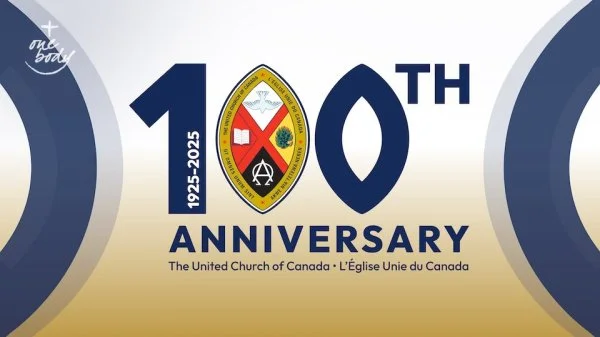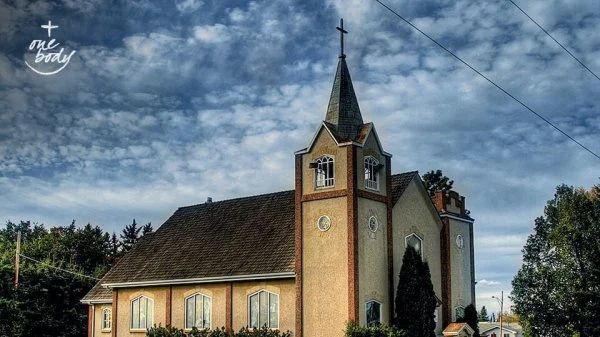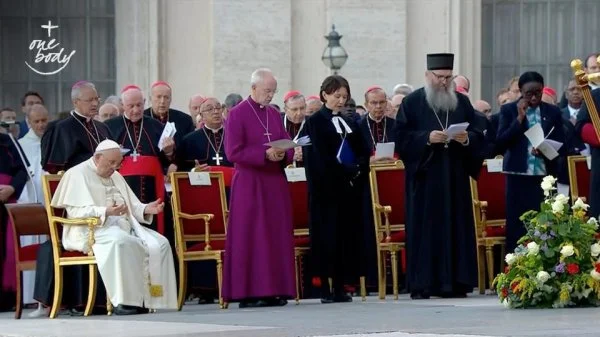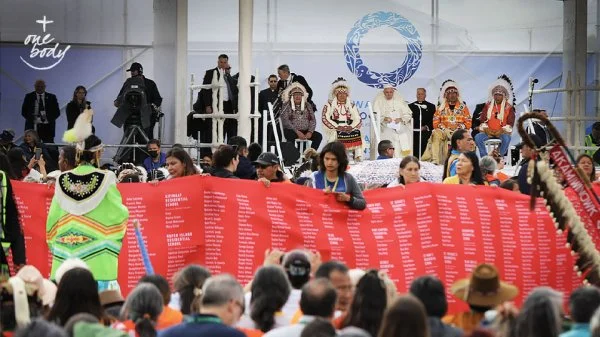- Français
- |
- Booklist
- |
- Week of Prayer
- |
- Links
- Areopagus - a forum for dialogue
- Academic journals
- Acronyms
- Bible tools
- Bibliographies
- Booksellers and publishers
- Churches
- Canadian church headquarters
- Directory of Saskatchewan churches
- Retreat centres
- Saskatchewan church and non-profit agencies
- Ecumenism.net Denominational links
- Anabaptist & Mennonite
- Anglican
- Baptist
- Evangelical
- Independent episcopal
- Lutheran
- Methodist, Wesleyan, and Holiness
- Miscellaneous
- Mormon
- Orthodox (Eastern & Oriental)
- Para-church ministries
- Pentecostal / charismatic
- Presbyterian & Reformed
- Quaker (Society of Friends)
- Roman & Eastern Catholic
- United and uniting
- Documents of Ecumenical Interest
- Ecumenical agencies
- Ecumenical Booklist
- Ecumenical Dialogues
- Glossary
- Human rights
- Inter-religious links
- Justice & peace
- Lectionaries
- Religious news services
- Resource pages
- Search Ecumenism.Net
- |
- Documents
- Ancient & Medieval texts
- Ecumenical Dialogues
- Interreligious
- Anabaptist & Mennonite
- Anglican
- Evangelical
- Lutheran
- Orthodox
- Reformed & Presbyterian
- Roman & Eastern Catholic
- United & Uniting
- Miscellaneous churches
- Canadian Council of Churches (CCC)
- Conference of European Churches (CEC)
- Interchurch Families International Network (IFIN)
- National Council of Churches in Australia (NCCA)
- Lausanne Committee for World Evangelism (LCWE)
- World Council of Churches (WCC)
- Other ecumenical documents
Church traditions
Documents from ecumenical agencies
- |
- Dialogues
- Adventist-Reformed
- African Instituted Churches-Reformed
- Anglican-Lutheran
- Anglican-Orthodox
- Anglican-Reformed
- Anglican-Roman Catholic
- Anglican-United/Uniting
- Baptist-Reformed
- Disciples of Christ-Reformed
- Disciples of Christ-Roman Catholic
- Evangelical-Roman Catholic
- Lutheran-Mennonite
- Lutheran-Mennonite-Roman Catholic
- Lutheran-Reformed
- Lutheran-Roman Catholic
- Mennonite-Reformed
- Mennonite-Roman Catholic
- Methodist-Reformed
- Methodist-Roman Catholic
- Oriental Orthodox-Reformed
- Orthodox-Reformed
- Orthodox-Roman Catholic
- Pentecostal-Reformed
- Prague Consultations
- REC-WARC Consultations
- Roman Catholic-Lutheran-Reformed
- Roman Catholic-Reformed
- Roman Catholic-United Church of Canada
- |
- Quick links
- Canadian Centre for Ecumenism
- Canadian Council of Churches
- Ecumenical Shared Ministries
- Ecumenism in Canada
- Interchurch Families International Network
- International Anglican-Roman Catholic Commission for Unity and Mission
- Kairos: Canadian Ecumenical Justice Initiatives
- North American Academy of Ecumenists
- Prairie Centre for Ecumenism
- Réseau œcuménique justice et paix
- Week of Prayer for Christian Unity
- Women's Interchurch Council of Canada
- World Council of Churches
- |
- Archives
- |
- About us
Archive for category: One Body
Archive pour catégorie : One Body
What if footwashing were a sacrament? Of all of the things that Jesus instructed the disciples to do, why didn’t footwashing become a sacrament like the others? Thoughts like these are one of the hazards of being a theologian.
I was thinking about this strange idea this week while reflecting on Pope Leo XIV’s new series of catecheses on Vatican II. Just when he is encouraging us to re-read the documents of the Council, the CCCB has issued a new National Strategy on Ecumenism. The first step in this strategy is to focus on education and formation about the church’s ecumenical teaching, beginning with the Council.
… Read more » … lire la suite »

 Permanent link: ecumenism.net/?p=14835
Permanent link: ecumenism.net/?p=14835
Categories: One Body, Opinion • In this article: baptism, diakonia, mission, ordinances, sacraments

 Lien permanente : ecumenism.net/?p=14835
Lien permanente : ecumenism.net/?p=14835
Catégorie : One Body, Opinion • Dans cet article : baptism, diakonia, mission, ordinances, sacraments
Every January, Christians across Canada gather with a hope older than our divisions and brighter than our differences: the hope that the Body of Christ may one day breathe again with fully united lungs. The Week of Prayer for Christian Unity is an annual observance. It is also an invitation to rediscover what we already share and what God still calls us to become together.
The 2026 materials for the Week of Prayer were prepared by the Churches of Armenia: the Armenian Apostolic Church, the Armenian Catholic, and Armenian Evangelical Churches. Together they form one of the oldest Christian cultures in the world, shaped by Scripture, martyrdom, and a liturgical and theological tradition in which the wisdom of the early Fathers still flows like living water. To receive these materials from the Armenian Churches is to listen to a voice that has carried the Gospel across empires, mountains, and diasporas.
… Read more » … lire la suite »

 Permanent link: ecumenism.net/?p=14858
Permanent link: ecumenism.net/?p=14858
Categories: One Body, Opinion • In this article: Armenian, Christian unity, spiritual ecumenism, WPCU

 Lien permanente : ecumenism.net/?p=14858
Lien permanente : ecumenism.net/?p=14858
Catégorie : One Body, Opinion • Dans cet article : Armenian, Christian unity, spiritual ecumenism, WPCU
Like the followers of many other faith traditions, Christians maintain that God is mystery, beyond all human words and knowing. Yet, Christians also believe their encounter with God in the person of Jesus and the activity of the Holy Spirit has given them a special revelation about who God is. Central to Christian faith is the belief that in Jesus of Nazareth, God (the Word of God) becomes human. Here is a radical statement, proclaimed in John’s Gospel: “The Word was made flesh and dwelt among us.” (John 1:14) This is the doctrine of the incarnation, from the Latin in carne “into flesh.” This is what we, Christians, are to live and proclaim as good news.
… Read more » … lire la suite »

 Permanent link: ecumenism.net/?p=14854
Permanent link: ecumenism.net/?p=14854
Categories: One Body, Opinion • In this article: Armenian, Assyrian Church of the East, Catholic, Christology, Coptic, dialogue, Eritrean Orthodox, Ethiopian Orthodox, Malankara Orthodox Syrian Church, Malankara Syrian Orthodox Church, Oriental Orthodox

 Lien permanente : ecumenism.net/?p=14854
Lien permanente : ecumenism.net/?p=14854
Catégorie : One Body, Opinion • Dans cet article : Armenian, Assyrian Church of the East, Catholic, Christology, Coptic, dialogue, Eritrean Orthodox, Ethiopian Orthodox, Malankara Orthodox Syrian Church, Malankara Syrian Orthodox Church, Oriental Orthodox
Rabbi David Seed and Catholic Biblical scholar Murray Watson are friends and colleagues. They are also members of the Christian-Jewish Dialogue of Toronto [CJDT], one of Canada’s oldest interfaith organizations, which is celebrating its 50th anniversary this year.
Over the course of three weeks in late September and early October (which included the Jewish High Holy Days), the two friends exchanged messages in a back-and-forth conversation about the significance of the upcoming 60th anniversary of Nostra Aetate. The ground-breaking Vatican II declaration on non-Christian religions was approved by Pope Paul VI and more than 2200 bishops on October 28, 1965. The document that eventually became Nostra Aetate started out as a document about Catholic teaching on Jews and Judaism. In its final form, kept its special place for Judaism and the Jewish people, denouncing antisemitism and violence against Jews, stressing the many areas of commonality between Jews and Christians, and summoning Catholics to engage in learning, dialogue, and cooperation with the Jewish community. It is the shortest of Vatican II’s 16 documents, but one of the most theologically significant; it has been the catalyst for a dramatic transformation in Catholic-Jewish relations, and has helped to inspire similar documents from other Christian communities.
… Read more » … lire la suite »

 Permanent link: ecumenism.net/?p=14848
Permanent link: ecumenism.net/?p=14848
Categories: One Body, Opinion • In this article: Jewish-Christian relations, Nostra Aetate, One Body, Second Vatican Council

 Lien permanente : ecumenism.net/?p=14848
Lien permanente : ecumenism.net/?p=14848
Catégorie : One Body, Opinion • Dans cet article : Jewish-Christian relations, Nostra Aetate, One Body, Second Vatican Council
“We believe.” These are the first words of the original Nicene Creed, written 1,700 years ago at the Council of Nicaea. This ecumenical council in 325 AD produced a summary statement of Christian belief that has been professed by Christians around the world ever since. Both for its longevity and its universal appeal, the Nicene Creed stands apart from every other statement of Christian belief. It also has a profound ecumenical significance, which I explored in January’s One Body article, Do You Believe This?
At the end of November, Pope Leo XIV is expected to visit Nicaea with Orthodox Patriarch Bartholomew. Each year, the pope and patriarch send delegations to the other to celebrate their patronal feasts of Sts. Peter and Paul in Rome on June 29 and St. Andrew in Constantinople (Istanbul) on November 30. This year, in the modern city of Iznik, where Nicaea once was, the two leaders will together commemorate the 1,700th anniversary of the first ecumenical council. They will also commend the church to continue in the dialogue of life and love begun at the end of the Second Vatican Council.
… Read more » … lire la suite »

 Permanent link: ecumenism.net/?p=14650
Permanent link: ecumenism.net/?p=14650
Categories: One Body, Opinion • In this article: Nicaea, Nicaea 2025, Nicene-Constantinopolitan Creed, WCC Commission on Faith and Order

 Lien permanente : ecumenism.net/?p=14650
Lien permanente : ecumenism.net/?p=14650
Catégorie : One Body, Opinion • Dans cet article : Nicaea, Nicaea 2025, Nicene-Constantinopolitan Creed, WCC Commission on Faith and Order
A number of years ago, at a local dialogue meeting of Catholics and Mennonites in Edmonton, we considered together that section of the Catechism of the Catholic Church that pertains specifically to the “one-ness” of the Church (#811-822).
I remember in particular a great discussion that ensued around CCC #815. It delineates the “bonds of communion” which, for Catholics, mark and hold Christians in unity with one another within the Body of Christ. That paragraph reads:
What are these bonds of unity? Above all, charity “binds everything together in perfect harmony.” But the unity of the pilgrim Church is also assured by visible bonds of communion:
- profession of one faith received from the Apostles;
- common celebration of divine worship, especially the sacraments;
- apostolic succession through the sacrament of Holy Orders, maintaining the fraternal concord of God’s family.

 Permanent link: ecumenism.net/?p=14648
Permanent link: ecumenism.net/?p=14648
Categories: One Body, Opinion • In this article: Catholic, dialogue, Dicastery for Promoting Christian Unity, Mennonite, Mennonite World Conference

 Lien permanente : ecumenism.net/?p=14648
Lien permanente : ecumenism.net/?p=14648
Catégorie : One Body, Opinion • Dans cet article : Catholic, dialogue, Dicastery for Promoting Christian Unity, Mennonite, Mennonite World Conference
This year, 2025, marks the 100th anniversary of the founding of The United Church of Canada (UCC). It is a uniquely Canadian church, formed in part in response to the desire to minister effectively to the many small Christian communities scattered across the sparsely populated prairie provinces. The UCC has been committed to the search for Christian unity from the time of its foundation, something it has clearly expressed in its fifty year dialogue with the Canadian Roman Catholic Church.
Following an exchange of correspondence between the UCC General Council and the Canadian Conference of Catholic Bishops (CCCB) in the fall of 1974, the Roman Catholic/United Church Dialogue held its first meeting in November 1975. Appointed by the UCC’s Inter-Church and Inter-Faith Relations Committee and the CCCB’s Episcopal Commission for Ecumenism, dialogue participants are committed to improving relationships between the two churches, and to countering misinformation, stereotypes, and prejudices. It explores pastoral, theological, and ethical issues, including those that have traditionally prevented full unity. In consultation with its two sponsoring bodies, the group determines its agenda, reports periodically on the dialogue and seeks ways of communicating what it has learned from the dialogue.
… Read more » … lire la suite »

 Permanent link: ecumenism.net/?p=14643
Permanent link: ecumenism.net/?p=14643
Categories: One Body, Opinion • In this article: Catholic, CCCB, dialogue, United Church of Canada

 Lien permanente : ecumenism.net/?p=14643
Lien permanente : ecumenism.net/?p=14643
Catégorie : One Body, Opinion • Dans cet article : Catholic, CCCB, dialogue, United Church of Canada
June 10, 2025 marks 100 years since 8,000 people gathered in the Mutual Street Arena in Toronto to formally inaugurate, with declarations and worship, The United Church of Canada. Members of the United Church today will easily acknowledge that its history is an ecumenical history, and they remember and celebrate its important contributions to the ongoing search for Christian unity and interfaith cooperation. Reflecting on this history in today’s world of increasingly violent division, fear, and distrust of difference, celebrations also bring questions: what is the continuing ecumenical call to a church committed to “Deep Spirituality, Bold Discipleship, and Daring Justice?”
I offer here a review of that ecumenical history: the beginnings and subsequent life and witness of the United Church, an overview of the church’s ecumenical witness today, and some questions and challenges arising as the church enters the next phase of its life in the world.
… Read more » … lire la suite »

 Permanent link: ecumenism.net/?p=14641
Permanent link: ecumenism.net/?p=14641
Categories: One Body, Opinion • In this article: dialogue, United Church of Canada

 Lien permanente : ecumenism.net/?p=14641
Lien permanente : ecumenism.net/?p=14641
Catégorie : One Body, Opinion • Dans cet article : dialogue, United Church of Canada
After Pope Francis died, an ecumenical colleague asked me about the ecumenical legacy of the late pope. As I endeavoured to answer him, I found myself clarifying at several points that Francis was not all that different in his ecumenical commitments from the previous popes, going back to Pope Paul VI and the Second Vatican Council. Each of the post-conciliar popes has presided over significant steps on the ecumenical journey, and Francis should be seen as continuing this same journey. As much as I love and appreciate him, I am uncomfortable giving Francis sole credit for achievements that are largely due to the efforts of ecumenical leaders in the Roman Curia, ecumenical agencies, theological dialogues, and national and local churches. The achievements of the ecumenical movement during the Francis papacy are certainly due to his guidance, encouragement, permission, and his genuinely open spirit, and it is for these that we can give thanks.
The Spirit asks us to listen to the questions, concerns, and hopes of every Church, people, and nation. And to listen to the world, to the challenges and changes that it sets before us. Let us not soundproof our hearts; let us not remain barricaded in our certainties. So often our certainties can make us closed. Let us listen to one another (Homily at the Mass Opening the Synodal Path, October 10, 2021).
Working as an ecumenist in the Francis years has been a great joy. I have been studying and working in ecumenism since the late 1980s, beginning in the middle years of Pope John Paul II and through the long years of Joseph Ratzinger/Pope Benedict XVI’s time at the Congregation for the Doctrine of the Faith (CDF) and then his papacy. These were positive years of ecumenical progress. John Paul II was a figure who transformed Catholic relations with the Evangelical world. He presided over the most significant years of bilateral dialogue with Anglicans, Lutherans, Orthodox, Methodists, and Reformed. He was the pope who approved the Joint Declaration on the Doctrine of Justification and issued common declarations on Christology with the Oriental Orthodox. He convened world religious leaders at Assisi to pray for peace.
… Read more » … lire la suite »

 Permanent link: ecumenism.net/?p=14573
Permanent link: ecumenism.net/?p=14573
Categories: One Body, Opinion • In this article: ecumenism, One Body, Pope Francis

 Lien permanente : ecumenism.net/?p=14573
Lien permanente : ecumenism.net/?p=14573
Catégorie : One Body, Opinion • Dans cet article : ecumenism, One Body, Pope Francis
Sometimes it is enough for two religious festivals to fall close to each other in the calendar for us to conclude that there must be some relationship between them. For example, the December holidays of Hanukkah and Christmas have led more than a few people to assume that, since both winter festivals involve gift-giving and candlelight, Hanukkah must therefore be some sort of “Jewish Christmas.” Of course, the two festivals are very, very different, commemorating very different historical events 160 years apart.
But sometimes holy dates that are adjacent on the calendar are related, and can even cast light upon each other. The Jewish 8-day festival of Passover [Pesach] and the Christian festival of Easter are not the same, by any means. Yet they are also interconnected in ways that are very thought-provoking and enriching, if we are willing to dig below the surface to learn more about them.
… Read more » … lire la suite »

 Permanent link: ecumenism.net/?p=14567
Permanent link: ecumenism.net/?p=14567
Categories: One Body, Opinion • In this article: Easter, Judaism, Murray Watson, Passover, Seder

 Lien permanente : ecumenism.net/?p=14567
Lien permanente : ecumenism.net/?p=14567
Catégorie : One Body, Opinion • Dans cet article : Easter, Judaism, Murray Watson, Passover, Seder
February is a special month to recognize and celebrate the many efforts made in communities all across Canada to promote healthy and active interreligious relationships.
For the past 15 years, the United Nations has designated February 1-7 as World Interfaith Harmony Week, dedicated to spreading “the message of harmony and tolerance among the followers of all the world’s religions, faiths and beliefs.” It adheres, in the broadest possible terms, to the principles of “Love of God (or the Good)” and “Love of Neighbour.”
In my own city, as in many Canadian cities, World Interfaith Harmony Week is marked by a variety of activities including open house events at churches, temples, mosques, and synagogues; educational and dialogue events; concerts and spoken word events; and of course prayer events led by and involving different religious communities. It is a beautiful weeklong celebration of local religious diversity, and an annual reminder and recommitment within each religious community, of the importance of supporting one another and working together for the common good.
While the Catholic Church does not officially mark World Interfaith Harmony Week, at least not within the liturgical calendar, many Catholics – from the popes on down – are actively engaged in promoting interreligious connections and activities all around the world. Indeed, it is not an exaggeration to identify the Catholic Church today as a leader in the field of interreligious relations.
… Read more » … lire la suite »

 Permanent link: ecumenism.net/?p=14535
Permanent link: ecumenism.net/?p=14535
Categories: One Body, Opinion • In this article: interfaith, Judaism, Julien Hammond, Nostra Aetate, One Body, Second Vatican Council

 Lien permanente : ecumenism.net/?p=14535
Lien permanente : ecumenism.net/?p=14535
Catégorie : One Body, Opinion • Dans cet article : interfaith, Judaism, Julien Hammond, Nostra Aetate, One Body, Second Vatican Council
When Jesus comes to Mary and Martha in Bethany after the death of Lazarus, he says to Martha “I am the resurrection and the life. Those who believe in me, even though they die, will live, and everyone who lives and believes in me will never die.” And then he asks her, “Do you believe this?” Martha responds, “Yes, Lord, I believe that you are the Messiah, the Son of God, the one coming into the world” (John 11:25-27). This exchange prepares us for the miracle of the raising of Lazarus: one who believed, yet even though he died, he lived. Like Lazarus, we who believe, even though we will die, will be raised by Jesus into eternal life.
“Do you believe this?” Jesus’ question puts us on the spot. Our belief, or profession of faith, determines whether we will inherit eternal life. At the same time, in other passages in the Gospels, Jesus reminds us that love of God is the greatest commandment, “and the second is like it,” to love our neighbour as ourselves (Matthew 22:37-39; Mark 12:30-31). “Truly I tell you, just as you did not do it to the least of these [the hungry, thirsty, stranger, naked, or imprisoned], you did not do it to me” (Matthew 25:45).
In every time, every place, and every way, Christians are called to profess their faith in Christ. Faith in God cannot be limited to simple dogmatic formulas but must embrace our whole heart, soul, and mind (Matthew 22:36; Mark 12:30). Faith compels us to order our lives in conformity with Christ’s command to care for the hungry, thirsty, stranger, naked, and imprisoned. What we have done or left undone exposes the imperfections of our profession of faith. So, Jesus’ question “Do you believe this?” is weighted with enormous significance for our lives in this world and the next.
… Read more » … lire la suite »

 Permanent link: ecumenism.net/?p=14466
Permanent link: ecumenism.net/?p=14466
Categories: One Body, Opinion • In this article: Nicaea, Nicholas Jesson, statements of faith, WCC Commission on Faith and Order, WPCU

 Lien permanente : ecumenism.net/?p=14466
Lien permanente : ecumenism.net/?p=14466
Catégorie : One Body, Opinion • Dans cet article : Nicaea, Nicholas Jesson, statements of faith, WCC Commission on Faith and Order, WPCU
The years following the closure of the Second Vatican Council in 1965 witnessed an explosion of bilateral ecumenical dialogues between various churches. Among these is the International Anglican-Roman Catholic Commission for Unity and Mission (IARCCUM), which traces its origins to a consultation of Anglican and Roman Catholic bishops in May 2000. It holds a unique place which may offer hope for renewed ecumenical progress.
Pope St. John Paul II and Archbishop of Canterbury Dr. George Carey signed a Common Declaration when Carey visited Rome in December, 1996. In response to that declaration, Carey and Cardinal Edward Cassidy, President of the Pontifical Council for Promoting Christian Unity (PCPCU), invited pairs of Anglican and Catholic bishops from around the world to gather at a retreat house in Mississauga, ON. Chosen by their fellow bishops to represent their respective Anglican Province or Episcopal Conference, they met to evaluate the state of Anglican-Roman Catholic relations and to chart a course for the future.
Grounded in prayer, the consultation began with a time of retreat, a shared meditation on conversion, communion, and a renewal of baptismal promises. On alternate days, the Eucharist, Morning Prayer, and Evening Prayer were celebrated according to the tradition of each communion. Making use of a theological reflection model based on experience, the gathering was designed with a minimum of input from other presenters at the consultation. Among the goals identified by the planning committee, it was hoped that the bishops would have an experience of exercising their episcopal ministry together during the consultation and continuing after, which might encourage commitment to a more regular exercise of shared ministry locally. With this in mind, a questionnaire was forwarded to the countries of the participating bishops prior to the conference. Responses to the questionnaire provided a kind of “map” of the state of current relationships, examples of ongoing joint witness, and issues which should be addressed together.
… Read more » … lire la suite »

 Permanent link: ecumenism.net/?p=14447
Permanent link: ecumenism.net/?p=14447
Categories: One Body, Opinion • In this article: Anglican, bishops, Catholic, dialogue, IARCCUM

 Lien permanente : ecumenism.net/?p=14447
Lien permanente : ecumenism.net/?p=14447
Catégorie : One Body, Opinion • Dans cet article : Anglican, bishops, Catholic, dialogue, IARCCUM
When most of us speak of “the New Year,” we are generally talking about January 1, the day when our Western civil calendar rolls over from one year to the next. But we know that we live in a world of multiple “new years,” such as the new school year which begins in the autumn, the new liturgical year that starts with the First Sunday of Advent, fiscal years for businesses and NGO’s, and the new year that a wedding anniversary inaugurates.
We also know that, in a diverse country like Canada, many of our neighbours follow religious and cultural calendars that mark various New Years, including the lunar new year (aka the “Chinese New Year”) celebrated by several Asian cultures. Both Islam and Judaism rely, either completely or partially, on a lunar calendar. This results in a year of 354 days — different from the solar calendar many of us in the Western Hemisphere use, which has 365 or 366 days. In Islam, this means that important holy days and seasons gradually “slip backwards” throughout the year, and can occur in any Western month. In Judaism, that variation is “corrected” by the insertion of an occasional “leap month,” which resets the calendar and ensures that important feasts occur, more or less, in the same seasons.
… Read more » … lire la suite »

 Permanent link: ecumenism.net/?p=14445
Permanent link: ecumenism.net/?p=14445
Categories: One Body, Opinion • In this article: calendar, Judaism, repentance

 Lien permanente : ecumenism.net/?p=14445
Lien permanente : ecumenism.net/?p=14445
Catégorie : One Body, Opinion • Dans cet article : calendar, Judaism, repentance
At the heart of Catholic ecumenism, there is a paradox. For Catholics, the papacy stands as a focus of unity. The pope exercises a primacy within the church as the successor to the apostles of unity, Peter and Paul, who established the church in Rome and whose tombs continue to be places of pilgrimage. Yet, despite this ministry of unity, the papacy itself is the greatest obstacle to unity in the church today.
In 1995 Pope John Paul II issued his encyclical on Christian unity, Ut Unum Sint, “That All May be One.” Known for his many great (and long) encyclicals and other letters to the church, the saintly John Paul invited us to a spiritual conversion both as individual Christians and as a church. He spoke about how the cause of Christian unity is not an appendix to the church’s work but an integral aspect of our mission as the body of Christ called to unity, holiness, catholicity, and apostolicity. He reminded us that spiritual ecumenism is at the heart of the ecumenical movement, and he invited us to pray regularly for the unity that Christ willed for the church. He called us to work, together with other Christians, in justice and social action for the common good.
He acknowledged that for many Christians separated from us, the history of the papacy and its claims to exercise authority in the church and world constituted an original cause of division that continues to be a source of irritation and a reminder of the great chasm between our churches. He noted that central to the papal claims is that he is the successor to the apostle Peter, the first among the Twelve. This “primacy” is a character, or charism, not only of the pope, but also of patriarchs of the Eastern churches, archbishops within their metropolitan territories, and bishops within their presbyterate. Primacy, like other charisms, is a gift of the Holy Spirit for building up the church in unity. The pope as primate of the universal church has a universal ministry of unity.
… Read more » … lire la suite »

 Permanent link: ecumenism.net/?p=14443
Permanent link: ecumenism.net/?p=14443
Categories: One Body, Opinion • In this article: Dicastery for Promoting Christian Unity, papacy, petrine ministry, Ut Unum Sint

 Lien permanente : ecumenism.net/?p=14443
Lien permanente : ecumenism.net/?p=14443
Catégorie : One Body, Opinion • Dans cet article : Dicastery for Promoting Christian Unity, papacy, petrine ministry, Ut Unum Sint
The last two articles of “One Body” have focused on Catholic-Lutheran relations in Canada, and beyond, through the lenses of:
- the development and reception of the Joint Declaration on the Doctrine on Justification (slmedia.org/blog/jddj-milestone-challenge), and
- the Evangelical Lutheran Church in Canada, a member of the Lutheran World Federation (LWF) (slmedia.org/blog/jddj-milestone-challenge).
Close readers of both articles will notice references made to a Christian community of Canadian Lutherans that is neither a member of the Lutheran World Federation nor a signatory to the Joint Declaration. These are Christians belonging to Lutheran Church-Canada (LCC), which I am pleased to spotlight in this month’s blog.
LCC was founded in 1988 out of the St. Louis-based Lutheran Church-Missouri Synod (LCMS), after the latter withdrew from North American Lutheran church merger talks. By their own reckoning:
Ministry during World War II helped the Canadian church recognize its national identity and in 1988, most of the LCMS congregations in Canada left the [Missouri] synod to form an autonomous body called Lutheran Church–Canada remaining in church fellowship with the LCMS. LCC has 300 congregations from British Columbia to Nova Scotia and a membership of almost 60,000. Its head office is in Winnipeg and its current president (elected in 2017) is Rev. Timothy Teuscher. (See: www.lutheranchurchcanada.ca/who-we-are/history/)
… Read more » … lire la suite »

 Permanent link: ecumenism.net/?p=14441
Permanent link: ecumenism.net/?p=14441
Categories: One Body, Opinion • In this article: Lutheran Church–Canada

 Lien permanente : ecumenism.net/?p=14441
Lien permanente : ecumenism.net/?p=14441
Catégorie : One Body, Opinion • Dans cet article : Lutheran Church–Canada
Just as individuals make use of passports or birth certificates to say who they are, creeds or confessions of faith are used to establish Christian identity. Where the earliest Christians were interested in identifying themselves as distinct from the followers of other religions, later controversies led to the development of creeds, confessions or conciliar texts in which one church defines its specific teaching in relation to that of another. When differences are seen as serious enough to affect the Gospel, churches may seek clarity by condemning the teachings of the other.
In the 16th century, Lutherans and Roman Catholics were involved in a dispute about certain aspects of the New Testament teaching on justification, how Christ’s saving action is received by those who are saved. They issued mutual condemnations which have continued to influence how each church sees the other. Edmund Schlink, a Lutheran observer at the Second Vatican Council, published his analysis of the Decree on Ecumenism in 1965. In it, he maintains that the statements of faith formulated in the 16th century, and their corresponding anathemas, are “the greatest stumbling block against reunion.” He notes as well that the Council Fathers had expressly reiterated their acceptance of Trent’s dogmatic decisions and did not intend to address those issues at that time. But, within the context of the Council, at a transition point between old and new attitudes, he identifies the present task of Protestant and Catholic theology as that of reinterpreting these old dogmatic statements and “explaining them in their historical setting” (J. A. Radano, Lutheran & Catholic Reconciliation on Justification Grand Rapids, MI, Eerdmans, 2009, p. 190).
… Read more » … lire la suite »

 Permanent link: ecumenism.net/?p=14434
Permanent link: ecumenism.net/?p=14434
Categories: One Body, Opinion • In this article: Catholic, JDDJ, Lutheran World Federation

 Lien permanente : ecumenism.net/?p=14434
Lien permanente : ecumenism.net/?p=14434
Catégorie : One Body, Opinion • Dans cet article : Catholic, JDDJ, Lutheran World Federation
A few weeks ago, I attended the Synod Convention of the ELCIC Saskatchewan Synod. The ELCIC is the Evangelical Lutheran Church in Canada, one of the more ecumenically engaged churches in Canada. I have known the ELCIC in Saskatchewan for many years. In fact, when I was the executive director of the Prairie Centre for Ecumenism in the 1990s, the ELCIC was one of our seven sponsoring churches and I worked very closely with the Saskatchewan bishop, clergy, and many lay people.
In some ways, attending the Synod Convention was a homecoming. There were many people there that I have known for 20 or 30 years. Although the Synod Convention is a governing council of the ELCIC with a long business agenda, the convention is also a time of gathering for this church spread across Saskatchewan. People come to see friends and remember past ministries. There were many prayer and social times to build up the community. As an invited observer from the Catholic Church, I was welcomed with hugs and I shared numerous conversations over the weekend about ministry together, past and present.
In this post, I want to introduce you to the ELCIC to help you see why this small church is of great importance to our ecumenical relations in Canada.
… Read more » … lire la suite »

 Permanent link: ecumenism.net/?p=14330
Permanent link: ecumenism.net/?p=14330
Categories: One Body, Opinion • In this article: Evangelical Lutheran Church in Canada

 Lien permanente : ecumenism.net/?p=14330
Lien permanente : ecumenism.net/?p=14330
Catégorie : One Body, Opinion • Dans cet article : Evangelical Lutheran Church in Canada
A few weeks ago, I attended the “Grand Opening” event of a new Buddhist Temple recently constructed in my north Edmonton neighbourhood. It was a beautiful event, marked by ritual and ceremony, hospitality and fellowship. It also involved a fair bit of informal interfaith dialogue with the monks of the temple and between fellow visitors of various traditions, who, like me, appreciated the opportunity to see inside the temple and to learn what this new community was all about.
This is now the third new non-Christian prayer space and second Buddhist temple to open in my neighbourhood in recent years, the other being a new mosque, adding to the array of Christian churches and other prayer spaces already present there. It also reflects the diversity of the population that now lives in “our part” of the city: a population that values spiritual realities and draws life from religious traditions “ever ancient, ever new,” to steal St. Augustine’s formulation.
… Read more » … lire la suite »

 Permanent link: ecumenism.net/?p=14312
Permanent link: ecumenism.net/?p=14312
Categories: One Body, Opinion • In this article: evangelism/evangelization, interfaith, multifaith, pluralism, proselytism, witness

 Lien permanente : ecumenism.net/?p=14312
Lien permanente : ecumenism.net/?p=14312
Catégorie : One Body, Opinion • Dans cet article : evangelism/evangelization, interfaith, multifaith, pluralism, proselytism, witness
With our recent celebration of the Easter Vigil in mind, it’s a good time to reflect on the ecumenical significance of baptism and offer a brief review of some of the dialogues that have taken place on this topic. From a Catholic perspective, the ecumenical significance of baptism is clearly affirmed in Vatican II’s Decree on Ecumenism, which states that: “all who have been justified by faith in baptism are incorporated into Christ; they therefore have a right to be called Christians, and with good reason are accepted as brothers [and sisters] by the children of the Catholic Church” (#3).
… Read more » … lire la suite »

 Permanent link: ecumenism.net/?p=14282
Permanent link: ecumenism.net/?p=14282
Categories: One Body, Opinion • In this article: baptism, Canadian Council of Churches, dialogue, Trinity, United Church of Canada, WCC Commission on Faith and Order

 Lien permanente : ecumenism.net/?p=14282
Lien permanente : ecumenism.net/?p=14282
Catégorie : One Body, Opinion • Dans cet article : baptism, Canadian Council of Churches, dialogue, Trinity, United Church of Canada, WCC Commission on Faith and Order
On January 25, at the annual ecumenical service in Rome that marks the end of the Week of Prayer for Christian Unity, Pope Francis spontaneously invited Archbishop of Canterbury Justin Welby to offer remarks after Francis’ own homily. Archbishop Justin’s reflection constituted a second homily, though it was called a “discourse” in the Vatican media. Such an invitation had only been offered to Orthodox bishops in the past, so this marked a significant sign of welcome between two leaders who have become close collaborators in a number of projects. On previous occasions, Archbishop Justin and his predecessors had been invited to offer remarks at a later portion of the liturgy, but never immediately after the homily.
… Read more » … lire la suite »

 Permanent link: ecumenism.net/?p=14086
Permanent link: ecumenism.net/?p=14086
Categories: One Body, Opinion • In this article: ARCIC, dialogue, IARCCUM, ministry, ordination, women

 Lien permanente : ecumenism.net/?p=14086
Lien permanente : ecumenism.net/?p=14086
Catégorie : One Body, Opinion • Dans cet article : ARCIC, dialogue, IARCCUM, ministry, ordination, women
Some friends of mine recently undertook a little renovation project in their home: nothing major – just a couple of bathrooms, a laundry room and a fresh coat of paint on some walls.
The plan looked simple enough on paper, but the reality of the renos soon became a bit more complicated – and costly – than initially anticipated. Removing old walls disclosed some surprises, newer building codes required adjustments to plumbing and electrical works, old appliances didn’t quite fit into new spaces, and a few unforeseen wall repairs were needed before the simple step of applying new paint.
I think about this in the context of the upcoming Lenten season, and the renovation project that Lent invites into all of our lives: individually and communally, and particularly as churches journeying together on the path of Christian unity.
… Read more » … lire la suite »

 Permanent link: ecumenism.net/?p=14043
Permanent link: ecumenism.net/?p=14043
Categories: One Body, Opinion • In this article: ecumenism, Lent, spiritual ecumenism

 Lien permanente : ecumenism.net/?p=14043
Lien permanente : ecumenism.net/?p=14043
Catégorie : One Body, Opinion • Dans cet article : ecumenism, Lent, spiritual ecumenism
Praying together with other Christians and even with members of other faiths has become so common over the past half century, it’s easy to forget earlier practice.
Archbishop Gilles Ouellet, a former chair of the CCCB’s Ecumenism Commission, talked about his experience in the Eastern Townships of Quebec. His father was a town councillor, and in this capacity took the young Gilles with him to attend the funeral of a prominent Protestant citizen. As they were entering the church, he recalled his father saying that they were attending the funeral “because it’s the right thing to do.” However, Archbishop Gilles was to remember that he was not to pray in that church.
… Read more » … lire la suite »

 Permanent link: ecumenism.net/?p=14040
Permanent link: ecumenism.net/?p=14040
Categories: One Body, Opinion • In this article: WPCU

 Lien permanente : ecumenism.net/?p=14040
Lien permanente : ecumenism.net/?p=14040
Catégorie : One Body, Opinion • Dans cet article : WPCU
Synods are ecclesial gatherings, intense moments of reflection on the Word of God symbolized by the presence of the Book of the Gospels enthroned in the midst of the assembly. The month-long General Assembly of the 16th Synod, which met in Rome from October 4 to 29, was an experience of prayerful listening. It began with an Ecumenical Prayer Vigil organized by the Taizé community on September 30, where young people from many countries led a series of meditations and intercessions for the world. Their words and gestures recalled the purpose of the synodal process: to help us become a church more responsive to the call to mission and service of the poor and those who suffer.
… Read more » … lire la suite »

 Permanent link: ecumenism.net/?p=14003
Permanent link: ecumenism.net/?p=14003
Categories: One Body, Opinion • In this article: Catholic, synodality

 Lien permanente : ecumenism.net/?p=14003
Lien permanente : ecumenism.net/?p=14003
Catégorie : One Body, Opinion • Dans cet article : Catholic, synodality
The great damage inflicted among Indigenous Peoples by the colonizing projects in North America/Turtle Island, including the far too frequent complicity of the churches with them, is something that can hardly be overstated. Most Canadian Christians are, I hope, relatively aware of the large-scale physical, cultural, and spiritual harms that were perpetrated by things like the reserve system, residential schools, and bans on traditional ceremonies and rites. Less widely considered, however, are the impacts that also came from the importing of inter-Christian hostilities from Europe to the Peoples of this land. Although less urgent than the direct and tangible abuses, here too there are harmful marks that must be reckoned with.
… Read more » … lire la suite »

 Permanent link: ecumenism.net/?p=13996
Permanent link: ecumenism.net/?p=13996
Categories: One Body, Opinion • In this article: Canadian Council of Churches, CCC Commission on Faith and Witness, ecumenism, Indigenous church

 Lien permanente : ecumenism.net/?p=13996
Lien permanente : ecumenism.net/?p=13996
Catégorie : One Body, Opinion • Dans cet article : Canadian Council of Churches, CCC Commission on Faith and Witness, ecumenism, Indigenous church
“There is no synodality without ecumenism and no ecumenism without synodality.” These words were spoken at the “Together: Gathering of the People of God” ecumenical service on Saturday, September 30, in St. Peter’s Square in Rome. When I heard these words from the podium, I took notice. Ecumenism and synodality are both reform movements in the church. The integral connection between the two seemed self-evident to me, but it’s a good reminder.
… Read more » … lire la suite »

 Permanent link: ecumenism.net/?p=13930
Permanent link: ecumenism.net/?p=13930
Categories: One Body, Opinion • In this article: synodality

 Lien permanente : ecumenism.net/?p=13930
Lien permanente : ecumenism.net/?p=13930
Catégorie : One Body, Opinion • Dans cet article : synodality
The recently concluded World Youth Day in Portugal (August 1-6, 2023) included a number of ecumenical and interreligious experiences, opportunities, and lessons that garnered praise and criticism in Catholic and non-Catholic circles alike.
- In addition to visiting and participating in events held within Catholic venues, WYD pilgrims were invited to visit significant Protestant and Orthodox churches and other houses of worship (synagogues, mosques, temples) in Lisbon and throughout the country, to “observe” how each religious denomination has its own history, content, ritual, and societal outreach.
- With fellow Christians, WYD pilgrims were invited also to participate in prayers, lectures, and bible studies offered by Anglican, Protestant, Orthodox Church leaders, and ecumenical communities (such as Taizé and Chemin Neuf), and to “look for signs of unity” (of faith, sacrament, and mission) between these Christian communities.
- On the interfaith side, organizers highlighted that “leaders of other faiths will be present at various events of the WYD Lisbon 2023 presided over by the Pope,” and indeed Pope Francis met with a number of ecumenical and interreligious leaders at significant events held throughout the week.
- Groups from various religious backgrounds participated in a Youth Festival program that featured “music and singing as a universal language that facilitates encounters between religions, cultures and peoples.”

 Permanent link: ecumenism.net/?p=13970
Permanent link: ecumenism.net/?p=13970
Categories: One Body, Opinion • In this article: ecumenism, next gen, youth

 Lien permanente : ecumenism.net/?p=13970
Lien permanente : ecumenism.net/?p=13970
Catégorie : One Body, Opinion • Dans cet article : ecumenism, next gen, youth
In 2024, The Canadian Council of Churches (CCC) celebrates the 80th anniversary of its founding. Anniversaries are an opportunity to review the past and look to the future, to celebrate what has been accomplished and to learn from past experience, with a view to developing a clearer self-understanding in the present and identifying a vision for the future.
… Read more » … lire la suite »

 Permanent link: ecumenism.net/?p=13974
Permanent link: ecumenism.net/?p=13974
Categories: One Body, Opinion • In this article: Canadian Council of Churches

 Lien permanente : ecumenism.net/?p=13974
Lien permanente : ecumenism.net/?p=13974
Catégorie : One Body, Opinion • Dans cet article : Canadian Council of Churches
“Though they differ from one another in essence and not only in degree, the common priesthood of the faithful and the ministerial or hierarchical priesthood are nonetheless interrelated: each of them in its own special way is a participation in the one priesthood of Christ” (Lumen Gentium, #10).
The reports issued during the diocesan and continental phases of the Synod on Synodality 2021-2024 offer a consistent call for a renewed understanding of the universal or baptismal priesthood. These reports frequently refer to the Vatican II quotation above, reminding us that 60 years ago, the church began to chart a new path in which the laity are not passive observers of the clergy’s active ministry. At times over the intervening years, lay ministry has been deemed a collaboration in what was typically understood as clerical ministry. The very word “ministry” has been frequently denied to lay people, who were instead meant to have an apostolate in the world. Pope Francis’ call to end clericalism has not meant an end to ordained ministry. He has cautioned against moves to clericalize lay ministry, pointing instead to the baptismal dignity of all. The Synod participants have noted the scriptural foundations for a baptismal priesthood.
… Read more » … lire la suite »

 Permanent link: ecumenism.net/?p=13734
Permanent link: ecumenism.net/?p=13734
Categories: One Body, Opinion • In this article: baptism, synodality, universal priesthood

 Lien permanente : ecumenism.net/?p=13734
Lien permanente : ecumenism.net/?p=13734
Catégorie : One Body, Opinion • Dans cet article : baptism, synodality, universal priesthood
At the root of Christian agreements and disagreements about Mary are matters that are at the same time biblical, doctrinal, historical, liturgical, theological, sociological, soteriological, ecclesiological, and so on. What does the Bible say or not say about Mary, and how is this to be interpreted? How much of what is professed about Mary belongs to the Tradition of the Church rather than directly found in Scripture? How much is from historical, cultural, or sentimental expressions developed within specific churches? Does Marian doctrine or devotion enhance or take away anything from the central focus on Christ? What is the relationship between God’s grace present and active in Mary’s life, and her own (and our own) human actions or belief? What is meant by the veneration of Mary (or of the saints) as distinct from worshipping God? When and by whose authority did Marian titles, feasts, and dogmas come to be assigned within the Christian Church? Are all such titles, feasts, and dogmas essential, obligatory, and/or intended to be marked with equal solemnity? How is Mary’s life and faith presented as a model for female Christian discipleship, or as exemplary for Christian life in general?
… Read more » … lire la suite »

 Permanent link: ecumenism.net/?p=13708
Permanent link: ecumenism.net/?p=13708
Categories: One Body, Opinion • In this article: Anglican, dialogue, Evangelicals, Groupe des Dombes, Mary, Methodist

 Lien permanente : ecumenism.net/?p=13708
Lien permanente : ecumenism.net/?p=13708
Catégorie : One Body, Opinion • Dans cet article : Anglican, dialogue, Evangelicals, Groupe des Dombes, Mary, Methodist
Have you ever greeted a neighbour with a “Happy Easter,” only to learn that they are still in the season of Lent and won’t be celebrating the Feast for another couple of weeks? In areas where Christians of different denominations live closely together, especially Eastern and Western churches, the search for a common date to celebrate Christ’s resurrection has become an urgent concern. As St. Paul makes clear (1 Corinthians 15:12-14), belief in the resurrection is a fundamental aspect of the apostolic faith. By celebrating this event on different days, Christians compromise their credibility and effectiveness in bringing the Gospel to an increasingly secular world.
… Read more » … lire la suite »

 Permanent link: ecumenism.net/?p=13572
Permanent link: ecumenism.net/?p=13572
Categories: One Body, Opinion • In this article: Date of Easter, dialogue, WCC

 Lien permanente : ecumenism.net/?p=13572
Lien permanente : ecumenism.net/?p=13572
Catégorie : One Body, Opinion • Dans cet article : Date of Easter, dialogue, WCC
I was recently asked how we know if a dialogue is successful. Even in the church, there is a temptation to assess projects and ministries by worldly standards. How much did it cost? How many people attended? How many people watched the video? These practical concerns should be considered, but other questions might be more critical. Did the experience transform people? Did this deepen or strengthen relationships between people or between the churches? What were the fruits of this project? What is the Spirit saying to the churches?
… Read more » … lire la suite »

 Permanent link: ecumenism.net/?p=13641
Permanent link: ecumenism.net/?p=13641
Categories: One Body, Opinion • In this article: Canada, CCCB, dialogue

 Lien permanente : ecumenism.net/?p=13641
Lien permanente : ecumenism.net/?p=13641
Catégorie : One Body, Opinion • Dans cet article : Canada, CCCB, dialogue
This year marks the 25th anniversary of We Remember: A Reflection on the Shoah, issued on 16 March 1998 by the Holy See’s Commission for Religious Relations with the Jews.
… Read more » … lire la suite »

 Permanent link: ecumenism.net/?p=13639
Permanent link: ecumenism.net/?p=13639
Categories: One Body, Opinion • In this article: anti-semitism, Catholic, Judaism, Shoah

 Lien permanente : ecumenism.net/?p=13639
Lien permanente : ecumenism.net/?p=13639
Catégorie : One Body, Opinion • Dans cet article : anti-semitism, Catholic, Judaism, Shoah
One day after his election to the papacy on April 19, 2005, Pope Benedict XVI addressed the College of Cardinals. He affirmed his commitment to the ecumenical agenda of his predecessor, Pope John Paul II, and identified his primary task as the impelling duty “to work tirelessly to rebuild the full and visible unity of all Christ’s followers.” He stated his readiness “to do everything in his power to promote the fundamental cause of ecumenism,” as well as his determination “to encourage every initiative that seems appropriate for promoting contacts and understanding with the representatives of the different Churches and Ecclesial Communities.” At the time of his death on December 31, 2022, tributes from ecumenical partners around the world testified to his fidelity to these commitments made at beginning of his papacy.
… Read more » … lire la suite »

 Permanent link: ecumenism.net/?p=13637
Permanent link: ecumenism.net/?p=13637
Categories: One Body, Opinion • In this article: Catholic, dialogue, Joseph Ratzinger, justification by faith, Lutheran, Pope Benedict XVI

 Lien permanente : ecumenism.net/?p=13637
Lien permanente : ecumenism.net/?p=13637
Catégorie : One Body, Opinion • Dans cet article : Catholic, dialogue, Joseph Ratzinger, justification by faith, Lutheran, Pope Benedict XVI
As the Minnesota Council of Churches began work on the 2023 theme materials for the Week of Prayer for Christian Unity, they reflected on the murder of George Floyd and the history of racism directed at people of colour in the United States. They also recalled the day in 1862 when 38 members of the Dakota tribe were hanged in Mankato, Minnesota, following the U.S.-Dakota War. As they were led to their deaths, the warriors sang the hymn Wakantanka taku nitawa (Many and Great).
The prophet Isaiah lived in Judah in the 8th century BCE, a time of prosperity in the two kingdoms, Israel and Judah. Yet, like other societies with wealth and power, great inequities existed. The rich and the powerful made offerings in the temple, and gained influence in the spiritual and ritual life of the kingdom. But the poor, who could not afford to offer sacrifices, were excluded from civil and religious life. The injustices of the time were not the result of specific choices of the religious or civil leaders but were the outcome of the structure of the society itself. In response, Isaiah called out for God’s justice. He denounced political, social, and religious structures that created and sustained inequity and oppression. He called upon the people to “learn to do good; seek justice, rescue the oppressed, defend the orphan, plead for the widow.” (Isaiah 1:17)
… Read more » … lire la suite »

 Permanent link: ecumenism.net/?p=13635
Permanent link: ecumenism.net/?p=13635
Categories: One Body, Opinion • In this article: anti-racism, racism, WPCU

 Lien permanente : ecumenism.net/?p=13635
Lien permanente : ecumenism.net/?p=13635
Catégorie : One Body, Opinion • Dans cet article : anti-racism, racism, WPCU
I can recall the day exactly in March 2020 when all of the busyness of my life – all my appointments, activities, events and plans – were simply wiped from my calendar: my coworkers and I were told to go home and to stay there until further notice, and everyone was asked to quarantine or at least to limit interpersonal contacts, until more information could be obtained as to the real threat that a new strain of coronavirus represented to our individual lives and indeed for all humankind.
It was a scary time as I recall, as little by little we learned details about this new plague that had set upon the world: hospitals were being overrun, death tolls were rising and there was no known cure for the virus. Places of communal gathering – churches among them – were asked to restrict access and if possible, to shutter their doors completely, which, of course, many did, to the rejoicing of some and the chagrin of others.
… Read more » … lire la suite »

 Permanent link: ecumenism.net/?p=13633
Permanent link: ecumenism.net/?p=13633
Categories: One Body, Opinion • In this article: COVID, eucharist, pandemic

 Lien permanente : ecumenism.net/?p=13633
Lien permanente : ecumenism.net/?p=13633
Catégorie : One Body, Opinion • Dans cet article : COVID, eucharist, pandemic
On two occasions this past year, Pope Francis has expressed his deep sorrow for the pain and trauma suffered by former students of residential schools and their descendants. At the end of March, he met with delegations of First Nations, Métis and Inuit Peoples in Rome where he stated: “Listening to your voices, I was able to enter into and be deeply grieved by the stories of the suffering, hardship, discrimination and various forms of abuse that some of you experienced, particularly in the residential schools. … I ask for God’s forgiveness and I want to say to you with all my heart: I am very sorry. And I join my brothers, the Canadian bishops, in asking your pardon.”
Following this initial meeting, he travelled to Canada in July where he re-iterated his heartfelt apology for Catholic involvement in residential schools and again joined with the Canadian Bishops in asking pardon. He stated: “Today I am here, in this land that, along with its ancient memories, preserves the scars of still open wounds. I am here because the first step of my penitential pilgrimage among you is that of again asking forgiveness, of telling you once more that I am deeply sorry…. I ask forgiveness, in particular, for the ways in which many members of the Church and of religious communities cooperated, not least through their indifference, in projects of cultural destruction and forced assimilation promoted by the governments of that time, which culminated in the system of residential schools.”
… Read more » … lire la suite »

 Permanent link: ecumenism.net/?p=13631
Permanent link: ecumenism.net/?p=13631
Categories: One Body, Opinion • In this article: apologies, Indigenous peoples, Pope Francis, Residential Schools

 Lien permanente : ecumenism.net/?p=13631
Lien permanente : ecumenism.net/?p=13631
Catégorie : One Body, Opinion • Dans cet article : apologies, Indigenous peoples, Pope Francis, Residential Schools
“The WCC puts unity before justice!” This was the complaint of one Canadian participant in the World Council of Churches’ 11th Assembly in Karlsruhe, Germany. The 65 Canadian participants gathered recently to debrief their experience of the August 31st to September 8th gathering of churches from around the world. The theme of the Assembly was “Christ’s love moves the world to reconciliation and unity.”
Back in May, Sr. Donna Geernaert wrote about the Assembly theme in her blog post “An Ecumenism of the Heart.” Over 3,750 church delegates, observers, advisors, visitors, and media came from around the world to Karlsruhe. WCC assemblies are only held every 7 or 8 years, so it was an excellent opportunity for me to attend along with my wife, Rev. Amanda Currie, one of the delegates from the Presbyterian Church in Canada.
… Read more » … lire la suite »

 Permanent link: ecumenism.net/?p=13629
Permanent link: ecumenism.net/?p=13629
Categories: One Body, Opinion • In this article: Christian unity, social justice, WCC Assembly

 Lien permanente : ecumenism.net/?p=13629
Lien permanente : ecumenism.net/?p=13629
Catégorie : One Body, Opinion • Dans cet article : Christian unity, social justice, WCC Assembly
Heat waves, rivers drying up, wild fires, floods, disappearing glaciers… Recent events in our own context and around the world leave no doubt that the daily life of our communities, our global partners, and the mission and ministries of our churches will increasingly be impacted by climate-related disasters, the trauma of those directly affected, and the fear and despair experienced by so many in the face of our destruction of creation.
… Read more » … lire la suite »

 Permanent link: ecumenism.net/?p=13627
Permanent link: ecumenism.net/?p=13627
Categories: One Body, Opinion • In this article: climate change, environment, Laudato Si'

 Lien permanente : ecumenism.net/?p=13627
Lien permanente : ecumenism.net/?p=13627
Catégorie : One Body, Opinion • Dans cet article : climate change, environment, Laudato Si'
The church is called to be anti-racist. Recently, I heard this quote from Ijeoma Oluo, author of So You Want To Talk About Race:
The beauty of anti-racism is that you don’t have to pretend to be free of racism to be an anti-racist. Anti-racism is the commitment to fight racism wherever you find it, including in yourself. And it’s the only way forward.
I find this quote provocative because I struggle to live in actively anti-racist ways. I find it provocative because I continue to detect in myself a desire to avoid admitting the racism in me and in my faith communities. Based on several recent experiences, which were simultaneously painful, frustrating, and holy, I have no doubt about the truth of the words it’s the only way forward.
… Read more » … lire la suite »

 Permanent link: ecumenism.net/?p=13625
Permanent link: ecumenism.net/?p=13625
Categories: One Body, Opinion • In this article: anti-racism, racism

 Lien permanente : ecumenism.net/?p=13625
Lien permanente : ecumenism.net/?p=13625
Catégorie : One Body, Opinion • Dans cet article : anti-racism, racism
One of the most beautiful and striking images that has stayed with me from the funeral mass of Pope John Paul II in 2005, was an ensemble of very ornately vested bishops gathered around the Holy Father’s coffin after communion, lifting up prayers and incense amidst a chorus of Greek and Arabic chanting.
The appearance of these bishops seemed to catch certain news announcers (even Catholic ones) off-guard, who referred to them variously as Greek Orthodox, Eastern Orthodox, Oriental bishops, and so on. Many Orthodox bishops did attend the funeral, of course, but these were seated in a separate section among Lutheran, Anglican, Evangelical, and other churches not in full communion with Rome.
… Read more » … lire la suite »

 Permanent link: ecumenism.net/?p=13623
Permanent link: ecumenism.net/?p=13623
Categories: One Body, Opinion • In this article: Catholic, Eastern churches

 Lien permanente : ecumenism.net/?p=13623
Lien permanente : ecumenism.net/?p=13623
Catégorie : One Body, Opinion • Dans cet article : Catholic, Eastern churches
At the invitation of the churches in Germany, Alsace–Lorraine, and Switzerland, the World Council of Churches (WCC) will hold its 11th General Assembly in Karlsruhe, Germany, from August 31 to September 8, 2022. Usually held every eight years, this assembly comes after a year’s delay because of the COVID pandemic which has taken many lives and highlighted the profound inequalities that exist in contemporary society. Bringing together more than 4000 participants from all over the world, a WCC Assembly is a special event in the lives of its 350 member churches, ecumenical partners, and other churches. With a membership including most of the world’s Orthodox churches, scores of Anglican, Baptist, Lutheran, Methodist, and Reformed churches as well as many charismatic, independent, united, and uniting churches, a WCC Assembly is the most diverse Christian gathering of its size in the world. It is a unique opportunity for the churches to deepen their commitment to visible unity and common witness.
… Read more » … lire la suite »

 Permanent link: ecumenism.net/?p=13621
Permanent link: ecumenism.net/?p=13621
Categories: One Body, Opinion • In this article: Karlsruhe, WCC Assembly

 Lien permanente : ecumenism.net/?p=13621
Lien permanente : ecumenism.net/?p=13621
Catégorie : One Body, Opinion • Dans cet article : Karlsruhe, WCC Assembly
When I first encountered interchurch families in my early ecumenical work, I had no idea that I would eventually marry someone from another church and become an interchurch family. I am now married to the Rev. Amanda Currie, a Presbyterian minister. Yet, at the time, I had little experience with theological or pastoral questions of marriage and family and no clue about how these would be significant in ecumenical relations in Canada.
Various surveys of Canadian dioceses since the 1980s have confirmed that 60% or more of marriages in Catholic parishes are what we used to call “mixed marriages”. This catch-all term includes marriages of a Catholic with anyone who is not Catholic, including other Christians, people of various other religions, and people with nominal or no religion. Most couples come to marriage with differing religious experiences or commitment levels, so most churches have historically cautioned against “inter-marriage” on practical grounds and sometimes with rather peculiar preconceptions about the other.
… Read more » … lire la suite »

 Permanent link: ecumenism.net/?p=13619
Permanent link: ecumenism.net/?p=13619
Categories: One Body, Opinion • In this article: interchurch families, marriage

 Lien permanente : ecumenism.net/?p=13619
Lien permanente : ecumenism.net/?p=13619
Catégorie : One Body, Opinion • Dans cet article : interchurch families, marriage
In more than one of our One Body articles, my fellow bloggers and I have emphasized the importance of deep, prayerful, heartfelt listening as essential to ecumenical ministry and engagement.
Such listening orients us to the voices of sisters and brothers from other churches and ecclesial communities; it invites us to consider the real (not our perceived or imagined) situation of their lives and calls us to be attentive to the ways in which the Lord may be speaking and working through them, for our sake (and theirs), and for the sake of the world.
… Read more » … lire la suite »

 Permanent link: ecumenism.net/?p=13617
Permanent link: ecumenism.net/?p=13617
Categories: One Body, Opinion • In this article: dialogue, listening, love, truth

 Lien permanente : ecumenism.net/?p=13617
Lien permanente : ecumenism.net/?p=13617
Catégorie : One Body, Opinion • Dans cet article : dialogue, listening, love, truth
A recent blog by Nick Jesson identifies “six signs of an ecumenical springtime” as a cause for renewed hope in the search for Christian unity. Not mentioned by Nick but perhaps a seventh sign of an ecumenical springtime is a growing appreciation for Saint John Paul II’s reference to dialogue as an ecumenical gift exchange. Pope Francis offers clear encouragement: “If we really believe in the abundantly free working of Holy Spirit, we can learn so much from one another!” (Evangelii Gaudium 246). With this in mind, the Catholic Ecumenical Officers of Western Canada saw Pope Francis’ invitation to the whole church, Catholic and ecumenical, to reflect together on synodality as an invitation to host an ecumenical panel on the topic.
… Read more » … lire la suite »

 Permanent link: ecumenism.net/?p=13615
Permanent link: ecumenism.net/?p=13615
Categories: One Body, Opinion • In this article: dialogue, synodality

 Lien permanente : ecumenism.net/?p=13615
Lien permanente : ecumenism.net/?p=13615
Catégorie : One Body, Opinion • Dans cet article : dialogue, synodality
When Wiarton Willie or his furry cousins poke their heads out to see if spring has come, there is just one sign that counts. Does he see his shadow? Of course, it’s all just fun; there is no causal relationship between a cloudy sky on February 2nd and an early spring. It is a lot more complicated when it comes to the signs of an ecumenical springtime, but there is much more cause for hope.
Since the mid-1980s, it has become commonplace to forecast an ecumenical winter in contrast to the enthusiasm of the 1960s and 70s. After the early achievements of post-Vatican II ecumenism, with key agreements on the Eucharist, ministry, authority, and various other controverted questions, progress slowed as ecumenists took up questions of ecclesiology, authority, and ethics. Yet after every winter comes spring. This blog post will explore six signs of an ecumenical springtime.
… Read more » … lire la suite »

 Permanent link: ecumenism.net/?p=13613
Permanent link: ecumenism.net/?p=13613
Categories: One Body, Opinion • In this article: ecumenism, hope

 Lien permanente : ecumenism.net/?p=13613
Lien permanente : ecumenism.net/?p=13613
Catégorie : One Body, Opinion • Dans cet article : ecumenism, hope
For Christians following the Byzantine lectionary, these words from the Gospel of Matthew are read on Christmas day. Indeed, for us Eastern Catholics who follow the Julian calendar, we heard those words just last week! While most of our neighbours have already finished their Christmas celebrations and moved past Epiphany, for some of us the party is just getting started. The accounting of the journey of the wise men provides lessons for us Christians: we see how Herod and the religious establishment wanted to harm the newborn King of Kings, while those who worshipped stars were among the first to recognize the coming of the Christ.
This year’s Week of Prayer for Christian Unity (January 18-25) has taken these same words from the Gospel of Matthew and incorporated them as its theme. It is a reminder for us in the West to look towards the ancestral Churches of the East in solidarity. Many of the faithful of these Churches today experience political, economic, and social turmoil in their everyday lives. Unity is needed more than ever.
… Read more » … lire la suite »

 Permanent link: ecumenism.net/?p=13611
Permanent link: ecumenism.net/?p=13611
Categories: One Body, Opinion • In this article: Eastern churches, spiritual ecumenism, WPCU

 Lien permanente : ecumenism.net/?p=13611
Lien permanente : ecumenism.net/?p=13611
Catégorie : One Body, Opinion • Dans cet article : Eastern churches, spiritual ecumenism, WPCU
In his homily at the Mass to open the two-year synod on synodality, Pope Francis reflected on the meeting recorded in the Gospel of Mark between Jesus and a rich man who asks him, “What must I do to inherit eternal life?” (Mark 10.17-22) In this encounter, Pope Francis identifies Jesus as one who listens “with his heart and not just with his ears.”
… Read more » … lire la suite »

 Permanent link: ecumenism.net/?p=13609
Permanent link: ecumenism.net/?p=13609
Categories: One Body, Opinion • In this article: Catholic, Pope Francis, synodality

 Lien permanente : ecumenism.net/?p=13609
Lien permanente : ecumenism.net/?p=13609
Catégorie : One Body, Opinion • Dans cet article : Catholic, Pope Francis, synodality
On November 16, 2021, the Canadian Anglican–Roman Catholic Dialogue (ARC–Canada) marks its 50th anniversary. In an increasingly divided world where relationships are more often defined by conflict than cooperation, this is indeed an occasion to celebrate! An ongoing dialogue where words are used not to dominate or control but to seek understanding is a critical counter-cultural witness in today’s world. In addition to celebration, a 50th anniversary is an invitation to reflect on the past and to consider what may be learned for the future.
… Read more » … lire la suite »

 Permanent link: ecumenism.net/?p=13607
Permanent link: ecumenism.net/?p=13607
Categories: One Body, Opinion • In this article: Anglican, Canada, Catholic, dialogue

 Lien permanente : ecumenism.net/?p=13607
Lien permanente : ecumenism.net/?p=13607
Catégorie : One Body, Opinion • Dans cet article : Anglican, Canada, Catholic, dialogue
Synod comes from the Greek syn and odos (meaning “with” and “path”) and refers to a way of living or working together. My favourite biblical passage for synodality is that of the disciples on the road to Emmaus, where Cleopas and his companion are joined by the resurrected Jesus, who walks with them and explains the scriptures to them. The biblical passage ends with a meal in which they finally recognize him in the breaking of the bread. Synodality is about walking together in a shared search for Christ in scripture, prayer, and common life.
… Read more » … lire la suite »

 Permanent link: ecumenism.net/?p=13605
Permanent link: ecumenism.net/?p=13605
Categories: One Body, Opinion • In this article: Catholic, synodality

 Lien permanente : ecumenism.net/?p=13605
Lien permanente : ecumenism.net/?p=13605
Catégorie : One Body, Opinion • Dans cet article : Catholic, synodality


